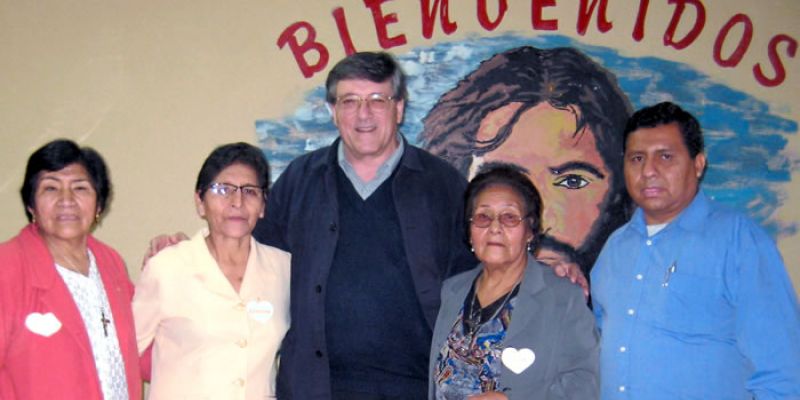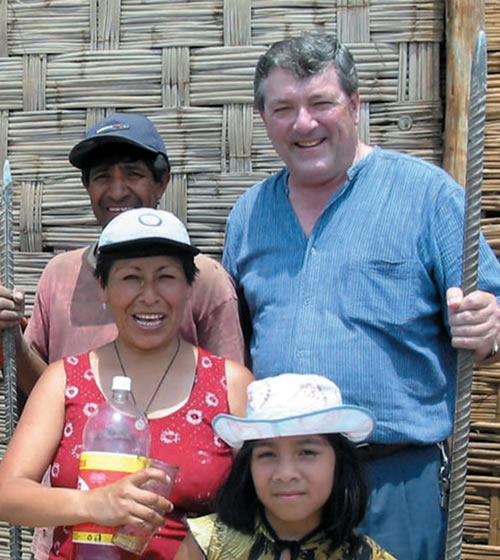
Weary, Joyous and Grateful
Socializing rarely energizes me. In fact, it usually drains me. However, recently I was in Lima for two weeks meeting friends with whom I'd shared something of my life over a period of 40 years. Without the help of a $17 secondhand cell phone (I suspect it was stolen goods) I could not have caught up with so many old friends during such a brief period of time. On the other hand, the cell phone facilitated such smooth coordination that I had no rest from taking taxis to meetings with friends to share food along with our life dreams and experiences – a time of joy, gratitude and laughter; and all this with an unstable stomach that nearly, but not quite, let me down. At the end of it all, I was so relieved to board the flight back to Australia. So, how might I claim to have been energized?

Soon after arriving in Lima I called on Nora, a pedagogue who has dedicated her life to the Peruvian state education system and lives a couple of blocks from the Columban house where I was staying. I stayed for a chat and lunch. It was so good to meet, remember and share something of our lives now being worked out on continents divided by the Pacific Ocean. I caught up with Maria, Serapio and their daughter Carmen, who took me up to a cemetery (a low price, do-it-yourself facility) set between hills on the north side of Lima. Maria's mother died not so long ago and is buried there, and Maria wanted a priest to say some prayers at the graveside. We trudged up the dusty road from where the taxi left us, stopping now and then to drink chicha morada (prepared by Maria). Two of the grandchildren also came and had a great time running around the graves looking for lizards and whatever else might amuse them.
I headed across to the other side of the city to see Olga and her terminally ill husband, Hugo. Other members of the first youth group I'd worked with arrived later in the evening. "We would not get together at all if it were not for you being here," they told me. The youngest present was 64-year-old Hector. Olga asked me to pray with Hugo, so I anointed him and the members of the one-time youth group stood around in a circle, spontaneously joining in the prayers. Hugo was wheeled into his bedroom, and the rest of us went on telling stories, laughing and enjoying a good meal. Olga could not help but laugh, too.
Some of the former members of the group were absent that evening, so we organized another gathering at Naty's house on the north side of the city. We were back in familiar territory, but I was fading by 11:00 p.m. and a friend drove me back to the Columban house. The rest of them stayed on for a few more hours drinking beer and generally enjoying each other's company. All of us had enjoyed Naty's large plate of traditional food. Some of them told me later that they were planning a major gathering in 2017 of all the former members of the group for the occasion of the 50th anniversary of its foundation. They suggested that it would be so good if I were to be there for the occasion. The more I've pondered the matter, the more I feel I'd like to be with them for that party. I learned so much from them years ago, and I know they are grateful for the time we had together in San Martin de Porres parish – the first in the world to be named after the saint (canonized in 1962 by Pope John XXIII). Before he was canonized the parish was named Blessed Martin de Porres.
Elizabeth, a Mercy Sister who had been on the parish team when I was in Tupac Amaru, was visiting at the same time, and I heard that one of the parish communities where she had worked was planning a Mass followed by the usual plate of food, concert items and speeches to send her on her way back to England. As I'd not seen Elizabeth for 20 or so years I turned up uninvited to join in the revelry. Community members were so welcoming, and even those I'd never met (as I left that parish in 1991) greeted me with a broad smile.
While there I organized meetings with friends I'd not seen for years. It was great to catch up with Simeon, who sold me some beautiful Peruvian jewelery (silver inlaid with various types of stone and shell), Betsabe and her daughter Olivia and her grand daughter Michelle Ellen (named after my mother whose name was Ellen May). Jesus (generally known as Dorival, his surname) was our master of ceremonies for the occasion. I regretted not having time to meet with others from that community, but those I did meet filled me in. Life is tough for them and always has been. I remember times when many families from that community had no food and relied on communal kitchens; such was life for Betsabe and her It was so good to meet, remember and share something of our lives now being worked out on continents divided by the Pacific Ocean. family. They work hard to get out of poverty and few do manage to do so but most never quite make it. The deck is definitely stacked against them.
A fellow Columban, Fr. Bernie Lane, invited me to address a group of lay leaders from parishes in which we work or have worked. The topic was, "mission as the key concept underpinning the proposal of Church renewal as outlined in Pope Francis' Evangelii Gaudium (The Joy of the Gospel)." There were at least 60 men and women of all ages present. I had prepared as well as time allowed but was rather nervous about my Spanish as I presumed it would be a little rusty after six years of little opportunity to use it. However, once I attempted to involve the audience all of us relaxed and moved into the set topic with sustained interest. The small group work following my presentation put the icing on the cake, and once again I felt grateful and buoyed by the joy of being with so many men and women who continue to search for ways to be missionary disciples of Jesus Christ.
I celebrated a Sunday Mass in the last parish I worked in before leaving Peru in January 2009. Luis organised things, and 20 of us ate a Peruvian breakfast of fried pork, raw onion and bread rolls, washed down with coffee and finally a small glass of anise – to counter the fat of the pork, they tell me! The Mass was as it should be with due solemnity and lots of participation by all present in readings, song and prayer. But then, at the end, came the big laugh as a couple renewed their wedding vows to mark 40 years of marriage. I invited them to the top of the step beside the altar and after they briefly renewed their vows, I blessed and congratulated them. The full church clapped and as they turned to return to the front row of benches and a mass chorus began to chant: "Que besen! Que besen! …" and then followed riotous laughter as the bride of 40 years ago seemed to resist. I've never seen anything that Peruvians love to do more than to celebrate and with gusto.
Alberto with Meche, his wife, and Teresa, his mother, invited me out for a meal, once again local style – fried meat and potatoes. Alberto also convened members of his community for a weekday Mass followed by a short but joyous reception. I remembered many names even though that has never been my forte, but those whose names I forgot simply chuckled and reminded me. I seem to be at that stage of life when one remembers many things five or Fr. Peter and friends ten minutes after the moment has passed. They recalled some things I'd done or said that were remembered with gratitude, one being a time when I'd asked forgiveness of a Sister who was old enough to be my mother. At times she seemed to expect from me a certain filial obedience, but I tended to dig in and do the opposite. The same Sister, a native of the Basque country, died in Spain a few years ago, aged 95.
The day I boarded the plane for Australia I had breakfast in the home of a man I'd known (but not well) for 30 years. We shared the meal with his wife and two sons and after the lads went about their business the three of us began to chat about this and that. The topic of marriage came up and his wife mentioned that they were not married in the Church. With the average Peruvian male's attitude to Church marriage in mind, I searched for a way around the issue that might avoid any serious discussion. I was a guest after all. I simply said, "But you have loved each other and continue to do so, don't you?" They laughed and that ended that. My friend walked with me to catch a taxi but, on seeing a hairdresser along the route, I delayed for a $2.50 haircut. My friend waited; we chatted with the young woman cutting my hair and then continued along towards the main road and a taxi.
I forgot to arrange a taxi to the airport so Fr. Bernie stepped into the breach and had me there in plenty of time to catch my flight. Thirty five hours later I was catching a taxi at Melbourne airport to the Columban house 15 minutes away. Weary, but also joyous and grateful.
Columban Fr. Peter Woodruff lives and works in Australia.


 The Columbans are a society of missionaries, including priests and lay people, who minister to people of various cultures as a way of witnessing to the universal love of God.
The Columbans are a society of missionaries, including priests and lay people, who minister to people of various cultures as a way of witnessing to the universal love of God.